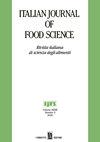通过抑制 PVT1/TGF-β/Smad 轴揭示康莱特在食管癌中的抗肿瘤和抗纤维化潜力
IF 3.6
4区 农林科学
Q2 FOOD SCIENCE & TECHNOLOGY
引用次数: 0
摘要
食管癌(EC)因其复杂的分子组成而成为世界范围内食管肿瘤中的一大难题,而食管癌的分子组成在很大程度上仍未得到研究。Kanglaite(KLT)是一种以抗肿瘤特性著称的药物,正在成为烹饪界的潜在盟友。浆细胞瘤变异易位 1(PVT1)在食管癌的复杂性质中扮演着重要角色,在肿瘤组织中显示出较高的表达水平。在研究过程中,我们发现 PVT1 在癌症组织中的存在率较高,这促使我们进一步探索其功能。通过操作技术,我们发现抑制 PVT1 不仅能阻碍食管癌细胞的生长,还能减少纤维化。这就好比提升菜肴的口感和风味。我们的研究揭示了其中的相互作用,强调了 PVT1 如何协调 TGF β/Smad 通路--食管癌发展的一个组成部分。介绍KLT--一位有望革新癌症治疗方法的专家。我们的研究证明了 KLT 在调节 PVT1/TGF-β/Smad 轴方面的有效性,揭示了它的纤维化特性及其阻碍食管癌进展的能力。有了这些发现,KLT有望成为治疗食管癌的一种选择。本文章由计算机程序翻译,如有差异,请以英文原文为准。
Unveiling the anti-tumor and anti-fibrotic potentials of Kanglaite in esophageal cancer through PVT1/TGF-β/Smad axis inhibition
Esophageal cancer (EC) poses a significant challenge among tract tumors worldwide due to its complex molecular composition, which remains largely unexplored. Kanglaite (KLT), a medicine known for its anti-tumor properties, is emerging as a potential ally in the culinary world. Plasmacytoma Variant translocation 1 (PVT1) plays a significant role in the complex nature of esophageal cancer, showing high expression levels in tumor tissues. During our investigation, we discovered a higher presence of PVT1 in cancer tissues, which led us to explore its functions further. Through manipulating techniques, we found that inhibiting PVT1 not only hinders the growth of esoph-ageal cancer cells but also reduces fibrosis. This is similar to enhancing the texture and flavor of a dish. Our study reveals the interactions at play, highlighting how PVT1 orchestrates the TGF β/Smad pathway – a component in the development of esophageal cancer. Introducing KLT, an expert poised to revolutinize the approach to cancer treatment. Our research demonstrates KLT’s effectiveness in regulating the PVT1/TGF-β/Smad axis, uncovering its fibrotic properties, and its ability to hinder the progression of esophageal cancer. With these discoveries, KLT emerges as a promising option for the treatment of esophageal cancer.
求助全文
通过发布文献求助,成功后即可免费获取论文全文。
去求助
来源期刊

Italian Journal of Food Science
工程技术-食品科技
CiteScore
4.20
自引率
0.00%
发文量
33
审稿时长
>36 weeks
期刊介绍:
"Italian Journal of Food Science" is an international journal publishing original, basic and applied papers, reviews, short communications, surveys and opinions on food science and technology with specific reference to the Mediterranean Region. Its expanded scope includes food production, food engineering, food management, food quality, shelf-life, consumer acceptance of foodstuffs, food safety and nutrition, energy and environmental aspects of food processing on the whole life cycle.
Reviews and surveys on specific topics relevant to the advance of the Mediterranean food industry are particularly welcome.
 求助内容:
求助内容: 应助结果提醒方式:
应助结果提醒方式:


